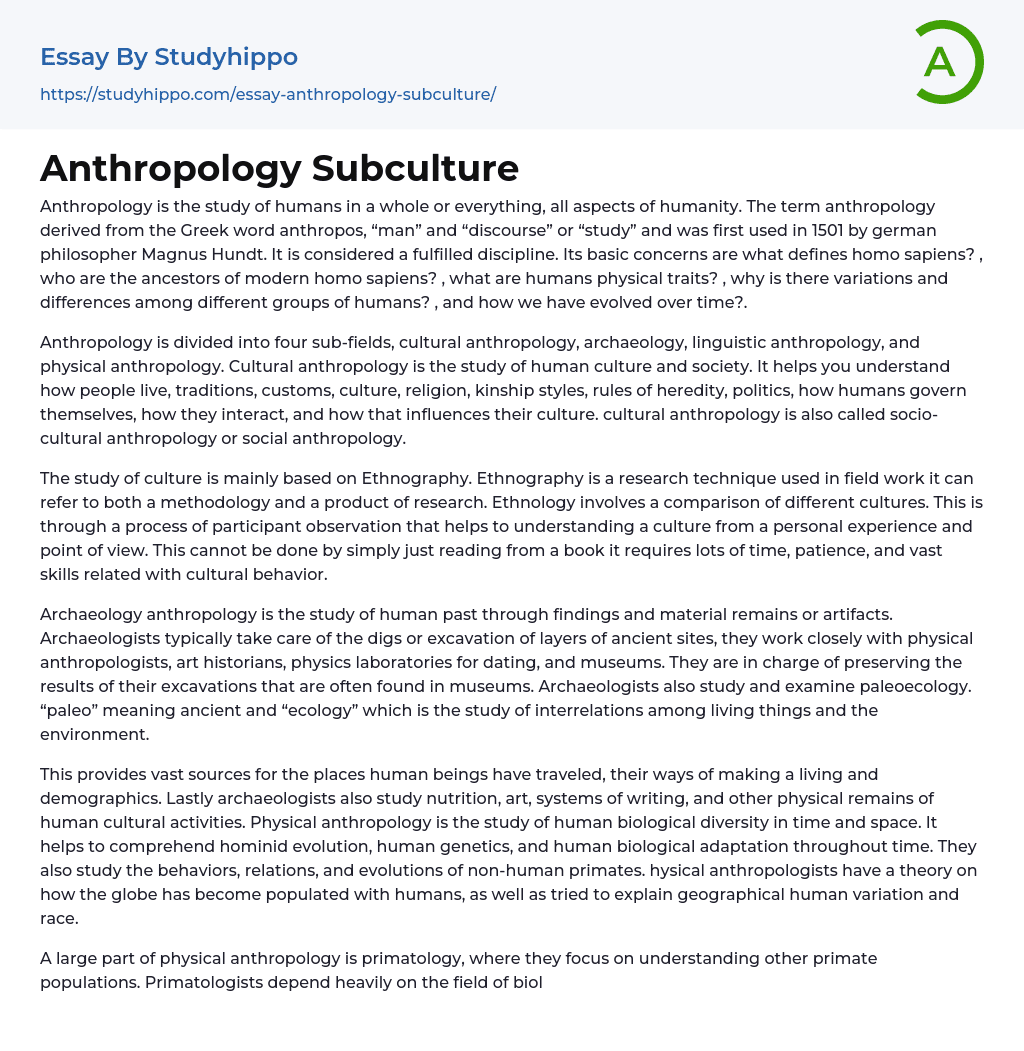Anthropology is the comprehensive examination of human beings, encompassing all aspects of humanity. The term "anthropology" was created by German philosopher Magnus Hundt in 1501 and comes from the Greek word anthropos, which means "man," and "discourse" or "study." This fully established discipline explores the definition of homo sapiens, traces the ancestry of modern humans' predecessors, analyzes physical characteristics in humans, investigates distinctions among different human groups, and understands our evolutionary progress.
Anthropology comprises four sub-fields: cultural anthropology, archaeology, linguistic anthropology, and physical anthropology. Cultural anthropology, also called socio-cultural or social anthropology, explores human culture and society. Its goal is to understand different aspects of human existence like lifestyle, traditions, customs, religion, kinship patterns, heredity rules, politics, governance methods, and social interactions; and how these factors influence their culture.
The study of c
...ulture is primarily conducted through the research technique known as Ethnography, which can encompass both methodology and the resulting research product. Ethnology, on the other hand, involves comparing diverse cultures. Participant observation is a crucial component of Ethnography, providing firsthand experience and perspective on a culture. This cannot be achieved solely by reading books; it necessitates substantial time, patience, and proficiency in understanding cultural behavior.
Archaeology anthropology encompasses the examination of artifacts and remains to explore human history and culture. This field entails supervising excavations, collaborating with physical anthropologists, art historians, physics labs for dating purposes, as well as museums. Archaeologists are accountable for conserving and exhibiting discoveries in museums. Additionally, they analyze paleoecology to comprehend the connections between organisms and their surroundings.
The following paragraph explores the different fields of study in archaeology and physical anthropology.
Archaeologists analyze human cultural activities, such as travel, livelihoods, demographics, nutrition, art, writing systems, and physical remains. In contrast, physical anthropology concentrates on human biological diversity encompassing hominid evolution, genetics, adaptation over time, and the behaviors and evolutions of non-human primates. Physical anthropologists also explore theories concerning human population distribution and geographical variations in humanity and race.
Physical anthropology includes the study of other primate populations through primatology, using biology and ecology. Another aspect is linguistic anthropology, which investigates language and cultural variations over time and space to understand human communication processes.
Linguistics encompasses various sub-fields. Descriptive linguistics is dedicated to developing grammars and vocabulary lists for unstudied languages. Historical linguistics focuses on reconstructing ancient languages that have transformed into modern ones. Ethnolinguistics examines the connection between language and culture, while sociolinguistics investigates the social aspects of language. Additionally, linguistics studies the evolution of language within different regions of the brain.
- Academic Degree essays
- Academic Dishonesty essays
- School Uniform essays
- Academic writing essays
- Cheating essays
- Population essays
- Cultural Assimilation essays
- Demography essays
- Ethnographic essays
- Population Growth essays
- Academia essays
- Academic And Career Goals essays
- Academic Integrity essays
- Brainstorming essays
- Brown V Board of Education essays
- Brown Vs Board Of Education essays
- Coursework essays
- Curriculum essays
- Distance learning essays
- Early Childhood Education essays
- Education System essays
- Educational Goals essays
- First Day of School essays
- Higher Education essays
- Importance Of College Education essays
- Importance of Education essays
- Language Learning essays
- Online Education Vs Traditional Education essays
- Pedagogy essays
- Philosophy of Education essays
- Purpose of Education essays
- Scholarship essays
- Study essays
- Studying Abroad essays
- Studying Business essays
- Technology in Education essays
- The Importance Of Higher Education essays
- Vocabulary essays
- Writing Experience essays
- Anthropology essays
- Audience essays
- Charity essays
- Cultural Competence essays
- Emile Durkheim essays
- Gender Roles essays
- Generation essays
- Globalization essays
- Interpersonal Relationship essays
- People essays
- Race essays




